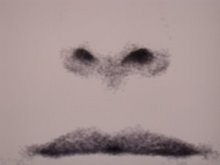This site is intended to be read as a whole - and the links on the top right link to all of the pages that make up Ainsi~Dire... If you are interested, and I hope you are, then read through this story of verboten, forbidden love. If not, tant pis... move on. But if you are at all interested in the inner-workings of love and the mind and the soul at its root and the body and what moves us, what pleases us - es gefelt mir - then read on....
welcome & thanks for visiting here.
asa

understand | verb - pronunciation: "&n-d&r-'stand
Function: verb
Inflected Form(s): un·der·stood /-'stud/; -stand·ing
Etymology: Middle English, from Old English understandan, from under + standan to stand
transitive verb
1 a : to grasp the meaning of <understand Russian> b : to grasp the reasonableness of understand><I thought we understood each other: i was certain we understood...> c : to have thorough or technical acquaintance with or expertness in the practice of <understand finance> d : to be thoroughly familiar with the character and propensities of <understands children>
2 : to accept as a fact or truth or regard as plausible without utter certainty understand that he is returning from abroad>
Tuesday, December 19, 2006
introduction
All blogs on this site are related back to this page, Ainsi-Dire. With that, it is suggested that after reading this page, that you read each page in turn, and if you like, you can click the link at the bottom of each page to return 'home' - that is, back to this page.
Ainsi-Dire exists only by way of explanation of what can otherwise, and perhaps still not, cannot otherwise be explained - that is, a relationship and a language created by two that defies ordinary language and that is outside the confines of what is considered socially 'ordinary' - a word that is already difficult to define in and of itself.
Perhaps there is something for you here, perhaps not. If not, simply move on. If so, then read on. If nothing else, perhaps it shines a spotlight on a world that you never knew existed or if you did, have not understood. Maybe even after reading you will not understand, and even this is understandable for even we two cannot define the us of 'us.' We never have been.
Ainsi-dire is then the first time, attempt, we have ever made to define the almost unspeakable, the thing that has defied all translation for both of our lifes. It is not a love that we have ever felt the need to explain and it is still not. This is not by way of explanation then; it is a way of sharing. This does not end love, it explains tiffs, quarrels we have had, love that exists, language we give, language we have taken away. What it does show however is that some loves, rare, screwed up perhaps, do last a lifetime - and that no matter the obstacle - family, daily life, and as we move through life and move on with family, with obligation, that there is an innocence maintained that is outside the ordinary and in our view then, outside of any judgment. What it says, and what we have always said and what I say, is that we do is turn our back of any judgment.
You may judge; you may say this is wrong. You may have all sorts of things to say, but they will never change the basic fact that what we have found, outside the confines of a world that would never have us be (and more, that would make an innocent and pure love a sordid thing) is that in loving each other, we have found a sanctuary and absolution that we have never found anywhere else.
Yes, we have tried at times to end this for various reasons. We have stayed away in some physical sense - distance, seeing and not acting, yet always there remains as there was before, the gentle touch of the knee beneath the table.
There is no betrayal here. Abner and Asa love each other in a way that is and never will be a threat to any other kind of love or lover. It is a thicker love, yet it does not threaten. We have made our peace with our obligations - with social expectation, with others, with whom else we love in another way. Yet always there is some love between us that runs a different course and no matter how hard we try, it simply cannot be given up. Abner, Asa, try. He holds the hair ribbon. She the silver spoon. If they meet, he brings with him a jar of honey, she the spoon. Somethings never change and they may simply speak and this is where it ends, but in the speaking and in the sharing, in the holding of a hand, in the sweetness of a simply slip of lip goodbye that lingers perhaps too long - just a moment - there is a love-making that is more than enough.
All then is without end... as we learned by code when we were still children, as we learned out of necessity, some things are truly sans-issue - that is, without end. And as with things like this, they are sous-silence, unspoken.
This here does not break that sous-silence. It remains unspoken. It is here for a brief time in black and white type, anonymous and clear. A love shared only by two now shared only with you and for us we remain as hidden behind our pear tree as ever, or covered by the tall privet bush.
In Abner's desk at work, there is a wrapped tissue square, and in it, all of the ribbons from my hair from all those years ago - a secret kept for so long. How good they are at keeping their secrets. You think they sin...
I think in their love lies the only true absolution.
Ainsi-Dire exists only by way of explanation of what can otherwise, and perhaps still not, cannot otherwise be explained - that is, a relationship and a language created by two that defies ordinary language and that is outside the confines of what is considered socially 'ordinary' - a word that is already difficult to define in and of itself.
Perhaps there is something for you here, perhaps not. If not, simply move on. If so, then read on. If nothing else, perhaps it shines a spotlight on a world that you never knew existed or if you did, have not understood. Maybe even after reading you will not understand, and even this is understandable for even we two cannot define the us of 'us.' We never have been.
Ainsi-dire is then the first time, attempt, we have ever made to define the almost unspeakable, the thing that has defied all translation for both of our lifes. It is not a love that we have ever felt the need to explain and it is still not. This is not by way of explanation then; it is a way of sharing. This does not end love, it explains tiffs, quarrels we have had, love that exists, language we give, language we have taken away. What it does show however is that some loves, rare, screwed up perhaps, do last a lifetime - and that no matter the obstacle - family, daily life, and as we move through life and move on with family, with obligation, that there is an innocence maintained that is outside the ordinary and in our view then, outside of any judgment. What it says, and what we have always said and what I say, is that we do is turn our back of any judgment.
You may judge; you may say this is wrong. You may have all sorts of things to say, but they will never change the basic fact that what we have found, outside the confines of a world that would never have us be (and more, that would make an innocent and pure love a sordid thing) is that in loving each other, we have found a sanctuary and absolution that we have never found anywhere else.
Yes, we have tried at times to end this for various reasons. We have stayed away in some physical sense - distance, seeing and not acting, yet always there remains as there was before, the gentle touch of the knee beneath the table.
There is no betrayal here. Abner and Asa love each other in a way that is and never will be a threat to any other kind of love or lover. It is a thicker love, yet it does not threaten. We have made our peace with our obligations - with social expectation, with others, with whom else we love in another way. Yet always there is some love between us that runs a different course and no matter how hard we try, it simply cannot be given up. Abner, Asa, try. He holds the hair ribbon. She the silver spoon. If they meet, he brings with him a jar of honey, she the spoon. Somethings never change and they may simply speak and this is where it ends, but in the speaking and in the sharing, in the holding of a hand, in the sweetness of a simply slip of lip goodbye that lingers perhaps too long - just a moment - there is a love-making that is more than enough.
All then is without end... as we learned by code when we were still children, as we learned out of necessity, some things are truly sans-issue - that is, without end. And as with things like this, they are sous-silence, unspoken.
This here does not break that sous-silence. It remains unspoken. It is here for a brief time in black and white type, anonymous and clear. A love shared only by two now shared only with you and for us we remain as hidden behind our pear tree as ever, or covered by the tall privet bush.
In Abner's desk at work, there is a wrapped tissue square, and in it, all of the ribbons from my hair from all those years ago - a secret kept for so long. How good they are at keeping their secrets. You think they sin...
I think in their love lies the only true absolution.
Sunday, December 10, 2006
an explanation of this site...

The pages of this site and the words herein are all from a dialect shared (until now) by only two and which had special, double meaning understood only by them. That is, ainsi dire - understood. When that ends, when there is no, as you will read, sous-silence, then the words mean nothing other than their original dictionary meaning.
They are listed here with the meaning between Asa & Abner as they once held, and now - please refer to the dictionary definition at the top left of the page for a truer understanding of the world.
The only word in that book that Asa made for Abner that still applies, and that is not on this site, is the word "fin," which is to say "end."
Divest each word of its sacred double-meaning. And when you think you're done, divest again. Each word slaps until the face it leaves it red raw, not with blush, but with humiliation, shame (how could I have been so stupid?) and pain.
She should have known better. Everything is final. Nothing is sans-issue, with the exception of perhaps two days in history - unspeakable, they happened; they made-love, then non, jamais plus...et moi? moi non plus.
je m'en vais. I've had enough. I would say, ne me quittes pas, but it's too late and I wonder if even he did... did he? The echo, "I thought I understood about the .... did I? I thought I did, but then... I think I did." She told him yes, and yes and yes and yes. Always Yes. Did Abner reassure? Not so much. He told her, I didn't miss a day while you were gone of the honey... but I missed you - I shouldn't have, but I did." She knew. She missed him too. Unbearable this.
What happened? Who knows. Fright takes flight. Maybe she intervened. Maybe innocence was lost on him and he perceived some complication that was not there. Maybe Asa became the Jezebel and he the martyr and she the seductress, yet it was he who offered the fruit.
Does it matter?
He keeps the small, square, 8-page booklet in his desk, tied with her hair ribbon. It means everything to him; something she thinks, revisiting his words. Don't get too invested, she thinks. It means something. He'll treasure it because it boosts his ego. It says, "Someone like Asa once loved me this much..."
What it should tell him, what I think is this: Abner you hurtful shit, you slapped me red-raw and now you want to be what? Friends? Is this how it works? We pick up when you want and when we don't well, we don't?
Keep your little book. Keep your mid-life crisis, but take it and run, but don't come running to me.
~ fin ~
Subscribe to:
Posts (Atom)




